By: Bethany Wight, Biologist
UF/IFAS Range Cattle Research and Education Center
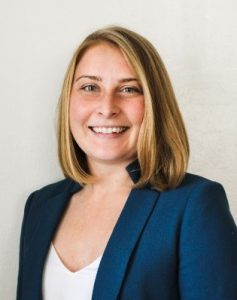
Elizabeth “Liz” Palmer grew up in Bernville, Pa, a small rural town. Her family owned a small feedlot and row crop farm. Growing up she was lucky her school had one of the few agricultural programs in the county. She was very active in school on the soccer and dance team, in the national honor society and the student council. When she was not busy with school activities she was helping her dad on the farm which started her interest in working in agriculture.
Elizabeth attended Pennsylvania State University and earned a Bachelor’s of Animal Science in 2016. During her sophomore year Liz worked in a dairy nutrition lab at Penn State and in the summer of 2015 she interned at the USDA Meat Animal Research Center in Clay Center, NE. During her internship with the USDA she worked in their environmental division investigating different methods to reduce greenhouse gas emissions in feedlots. This involved applying different bedding material to manure buckets in a laboratory setting to assess how it altered gas emissions. After graduating Liz was a Lloyd Nobel Scholar in Agriculture at the Lloyd Nobel Research Institute in Oklahoma. Here she spent the summer working with consultants in beef cattle management and nutrition. Her project at the institute involved working with the Integrity Beef Alliance program, a value-added pre-conditioning program, producing marketing material, meeting producers, and gaining experience in extension services.
“During my junior and senior year, I was given my own undergraduate project. This is what originally sparked my interest in nutrition and research. My summer at the USDA further solidified my decision to apply for graduate school.”
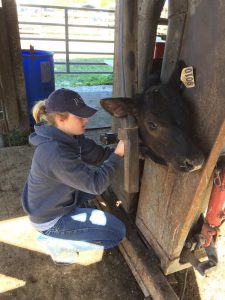
In 2016, Liz moved to Fayetteville, Arkansas to pursue a Master’s degree in Animal Science at the University of Arkansas. Her master’s research focused on the inclusion of yeast products in beef cattle diets pre-partum as well as pre- and post-weaning. Her first project included feeding two commercial yeast products to receiving cattle and looking at growth performance and health. Next, they provided a combination of yeast products pre-weaning in a creep-feed and followed responses for 42 days following weaning. Lastly, her third project provided yeast products to cows during late gestation and followed the calves after birth. Her master’s experience led her to become more interested in nutritional management of cows during gestation and how it impacts their calves.
“During my master’s I was very involved in the experimental design and proposals so I gained a range of experience from the design to the end analyses. I also gained experience in many techniques such as, collecting blood samples, performing ELIZA assays, flow cytometry and working with micro biomarkers.”
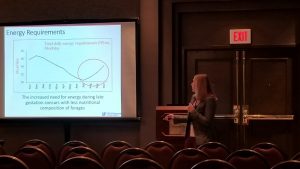
After completing her Master’s degree Liz knew she wanted to continue her education and research. She had become familiar with the research that was being conducted at the UF/IFAS RCREC while studying for her Master’s degree. Liz moved down to Florida and started her PhD work with Dr. Philipe Moriel with the beef cattle nutrition and management program at the center in 2018.
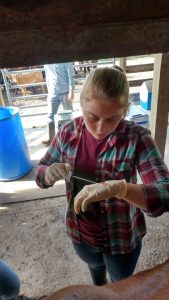
Liz’s dissertation research focuses on nutritional strategies during gestation and the subsequent effect on calf health and growth performance. More specifically she is first looking at the timing of a protein and energy supplement during late gestation by providing dried distillers grains during the first half of late gestation or for the entire length of late gestation. The second part of her study is investigating the effects of providing molasses or range cubes year-round vs. molasses supplementation in the winter only.
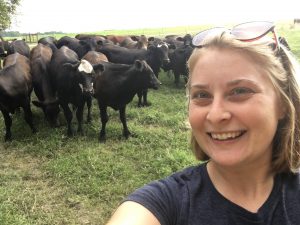
They are also working in collaboration with the Butner Beef Cattle Laboratory at North Carolina State University to collect feedlot and carcass data on the steer calves from both studies. During these studies she collected data from cows including body condition scores, weights, pregnancy rates, time of calving, and various blood metabolites. They collected pre-weaning BW on calves and also investigated response to vaccination at weaning by looking at anti-body titers. Post-weaning steers were sent to the NCSU Butner Beef Cattle Lab and they collected weights, dry matter intake and then carcass data. Both studies combine investigating nutritional strategies, how they influence cow reproductive and growth performance and the subsequent effects on calf health and growth.
When Liz is not conducting research she enjoys running, hiking and spending time with her family. Liz is planning to graduate in the summer of 2021.
“Following graduation I would like to get a job working in research and extension and continue investigating nutrition and animal health. I am looking forward to see what opportunities arise.”
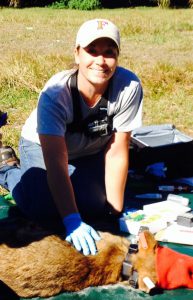
This was written by Bethany Wight, a biological scientist at the UF/IFAS Range Cattle REC in Ona, FL. If you have questions please contact her at bwight@ufl.edu. For more information on the UF/IFAS Range Cattle REC Animal Science Program, visit https://rcrec-ona.ifas.ufl.edu/animal-science—philipe-moriel/
 0
0
